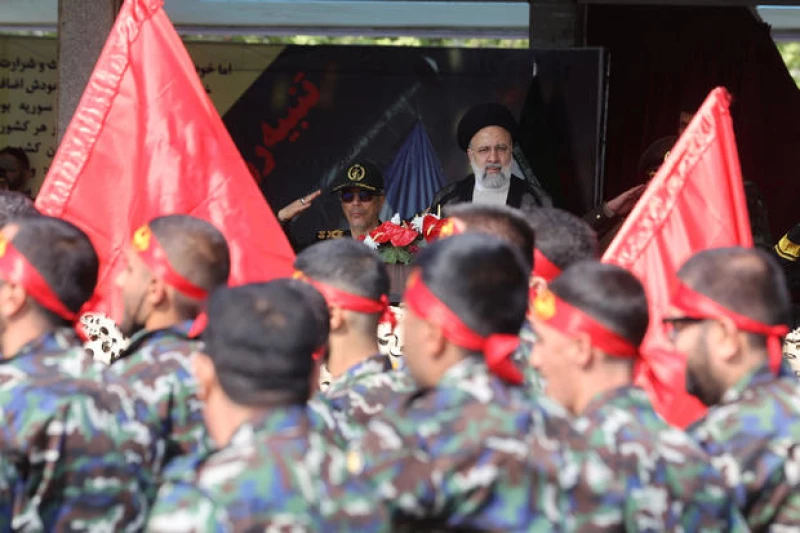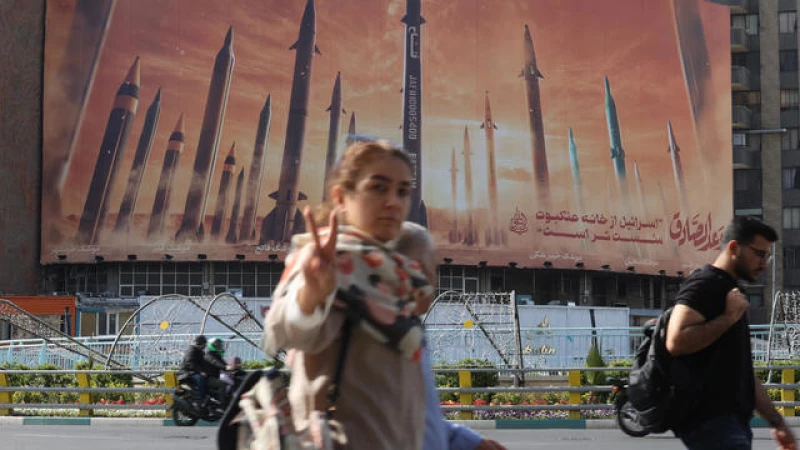Tehran — Following the announcement on Iranian state TV that the Islamic Revolutionary Guard Corps had deployed hundreds of drones and missiles, crowds flooded the streets in Tehran and other cities to express their support for Iran's first-ever direct military strike against Israel.
Iran had promised to retaliate for the deaths of seven IRGC officers in an airstrike that targeted an Iranian consulate in Syria's capital about a fortnight ago. Although Israel has not officially claimed responsibility for the attack, it has not refuted it either.
As the world awaits to see how Israeli Prime Minister Benjamin Netanyahu's administration will react to the Iranian assault, which reportedly caused "minimal damage," as per the Israel Defense Forces. The IDF stated that over 99% of the 300-plus weapons launched were either intercepted or destroyed before reaching Israeli territory, thanks to the nation's strong air defense system and assistance from its U.S. and European allies.
- U.S. wouldn't participate in Israeli reprisal strike on Iran, officials says
As the U.S. works to prevent Israel's ongoing war against the Iran-backed Palestinian group Hamas from spreading into a much wider regional conflict, President Biden urged his Israeli counterpart right after the Iranian attack was thwarted, "to think about what that success says all by itself to the rest of the region," according to National Security Council spokesperson John Kirby.
Kirby said the U.S. was "working with international partners to work up options to hold Iran appropriately accountable."
But the White House has made it clear that the decision on how to retaliate will be Israel's to make, and that leaves plenty of room for anxiety across the tinderbox Middle East. But not too much, it would seem, in Iran.
Life goes on in Iran
Since the Iranian attack on Israel, there have been no signs that the Islamic republic is preparing for a war. Far from political and military leaders running for bunkers in fear of an Israeli reprisal strike, there have been no military drills, schools remain open. Iranian authorities haven't imposed any restrictions on air traffic.
Even ordinary Iranians appear relatively relaxed. There has been no obvious rush on supermarkets by people trying to stock up on essentials, and everyday life has gone on largely as normal.
The only direct impact thus far has been a predictable hike in the value of foreign currencies compared to Iran's. The ensuing rise in some commodity prices has brought back long lines for gas, but those are familiar in the heavily-sanctioned nation.
But there is cause for concern among Tehran's ruling class, and most of it's rooted in those financial factors. Stifled under some of the toughest international sanctions imposed by the U.S. and its allies on any nation, Iran's economy has been crippled for years. There's sky-high inflation and Iran remains mired in a deep recession.
Iran's economic woes
For Iran's leaders, the economy is likely a first concern. A wave of resentment over the country's dire finances and its strict interpretation of Islamic law has manifested in political unrest and street protests in recent years. Some have even seen people chanting risky calls for a change of leadership.
But Iranian political analyst Hadi Mohammadi told CBS News he believes Iran walked the right line with its attack on Israel, and Mohammadi says Iran's leaders have their nation's backing.
"The Iranian people's social behavior against common enemies in wars and frictions has proven that they mostly stay united," he told CBS News, suggesting a sense of national unity in the face of a perceived foreign threat is greater than any quarrel Iranians might have with their own leaders.
He pointed to opinion polls carried out just days before the Iranian reprisal against Israel that showed a majority of people supporting the looming operation.
"Some of those who were critical of the administration still supported a military response to prevent the enemy from repeating its actions," a spokesperson stated. "While some preferred a diplomatic approach and others opposed any military retaliation, the majority leaned towards a military response."
Concerns Over Economic Impact of Potential Conflict
Despite the division among the Iranian people, many are apprehensive about the consequences of escalating tensions and the potential for a full-scale war with Israel.

Given Iran's stringent laws on political expression, few individuals are willing to openly criticize the government's actions. However, some Iranians shared their perspectives with CBS News on the condition of anonymity.
Sali, a 30-year-old art graduate residing in Tehran with her family, expressed concerns about the economic impact of a potential war. She emphasized, "A conflict with Israel would have a devastating effect on the economy."
"I believe the Iranian government is allocating excessive funds to its proxies in the region and prioritizing the Palestinian cause over addressing domestic issues," she remarked. "This approach has exacerbated economic hardships for the people."
On the other hand, Reza, who is employed in the private sector, voiced his opposition to any form of war. "I am completely against war. It does not benefit anyone," he asserted. "With the economy already struggling, engaging in any scale of conflict would only worsen the situation. People are already enduring hardships, and I advocate for peace between both nations."
Iran Issues Warning to Israel
Iran's leaders have once again reiterated their refusal to acknowledge Israel as a legitimate state and have issued a stern warning in response to any potential Israeli counterattack.
Retired Iranian Air Force pilot Rahim Gasemi emphasized the seriousness of the situation, stating, "It was quite right to give a strong message to Israel. If Israel attacks us again, we will strike again, too."
The tension between the two nations has many Iranians on edge, hoping that the situation does not escalate into further conflict.







